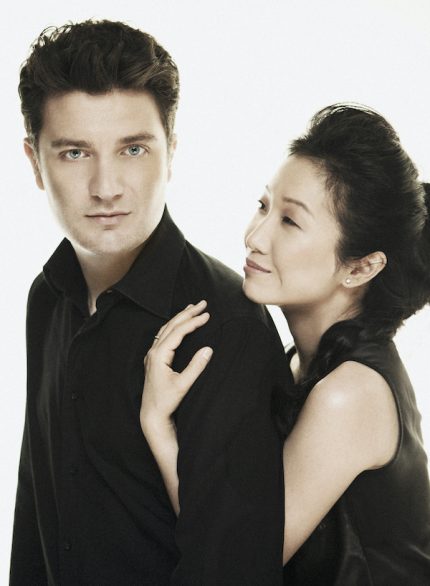176 keys to a successful partnership with pianists Bax & Chung

North Shore Chamber Music Festival’s concert proved that four hands can be better than two Saturday night—at least when those hands belong to husband-and-wife piano duo Alessio Bax and Lucille Chung.
Accomplished solo concert pianists in their own right, Bax and Chung demonstrated just how well matched they are, both on the piano bench and off. The duo presented a concert of French music for piano four hands or two pianos. Held at the PianoForte studio in the South Loop, the artists had the privilege of playing two gorgeous, velvet-toned Faziolis.
Bax and Chung were remarkably in sync from the start, both rhythmically and interpretively. Their intimate connection was especially apparent in the pieces for piano four hands. In the Menuet movement of Debussy’s Petite Suite for piano four hands (1889), they tenderly leaned into each other ever so subtly, as if they were dancing along with the music.
Debussy’s En blanc et noir for two pianos (1915) proved that they do not need to share a bench to have impeccable ensemble. In the first movement, there were impressive moments of perfectly aligned, complicated syncopations. As Bax noted in the Q&A after the concert, the percussive nature of the piano requires that the two pianists be of exactly the same mind about the performance of a piece, as even the slightest difference can make the sound muddy and off-kilter. Luckily for the audience, this was never an issue.
The haunting second movement, dedicated to a Debussy’s friend killed in World War I, was especially affecting. Quasi-sacred harmonic progressions were suspended in mid-air, and a grotesque quotation of “Ein feste Burg ist unser Gott” thundered amid a cluster of discordant, mechanized murmurings. Written a year after France entered the war when anti-German sentiment was strong, this piece served as a stark reminder of what was lost and the senselessness of the war.
Poulenc’s short Sonata for piano four hands (1918), written by the composer at age 19, was a hormone-fueled romp with plenty of strategic hand-crossing, as Poulenc supposedly wrote the piece so he could get close to a student he fancied. In her introduction, Chung joked that it was okay, though, because she and Alessio are married.
The duo switched positions for Ravel’s transcription for piano four hands of Debussy’s famous Prélude à l’après-midi d’un faune, with Bax assuming the primo (treble) position and Chung moving to secondo. This made for a nice change to hear Bax in a more prominent role and be witness to his melodic expression and sensitivity, particularly in the famous opening motif, which he played with great delicacy. Throughout, the two demonstrated an orchestra of colors at their fingertips, and the sensuousness of the music was heightened by their intimate connection.
The orchestral demands continued, as Ravel’s transcription for two pianos of his own choreographic poem for orchestra, La Valse (1920), put the duo through their paces. In this “waltz to end all waltzes,” the pair took the audience spinning manically through an opulent Viennese ballroom. An enormous amount of musical information was condensed into four hands, and at times, it seemed like the two were trying to get more sound out than two pianos would allow. However, the vurtuosity of Chung and Bax was stunning and both musicians looked understandably exhausted afterward.
Luckily, they still had some energy left to give an encore of Astor Piazzolla’s crowd-pleaser, Libertango, which they had adapted for piano four hands, adding their own improvisations on top of the version for solo piano. Again, the two danced as if in an intimate tango, and their interpolations were lush and indulgent.
Equally matched in technical skill, sensitivity, and expression, the pair still had distinct personalities—Bax more introverted and Chung more physically emotive. Chung was especially engaging to watch, and Bax’s placid demeanor belied the technical demands of the repertoire, like a swan swimming serenely while paddling furiously under the water’s surface. These different but complementary musical personalities are clearly a crucial part of what makes the couple such an excellent musical team.
North Shore Chamber Music Festival’s next concert is a program celebrating the 100th anniversary of Astor Piazzolla featuring violinist Philippe Quint on November 27. nscmf.org
Posted in Uncategorized

